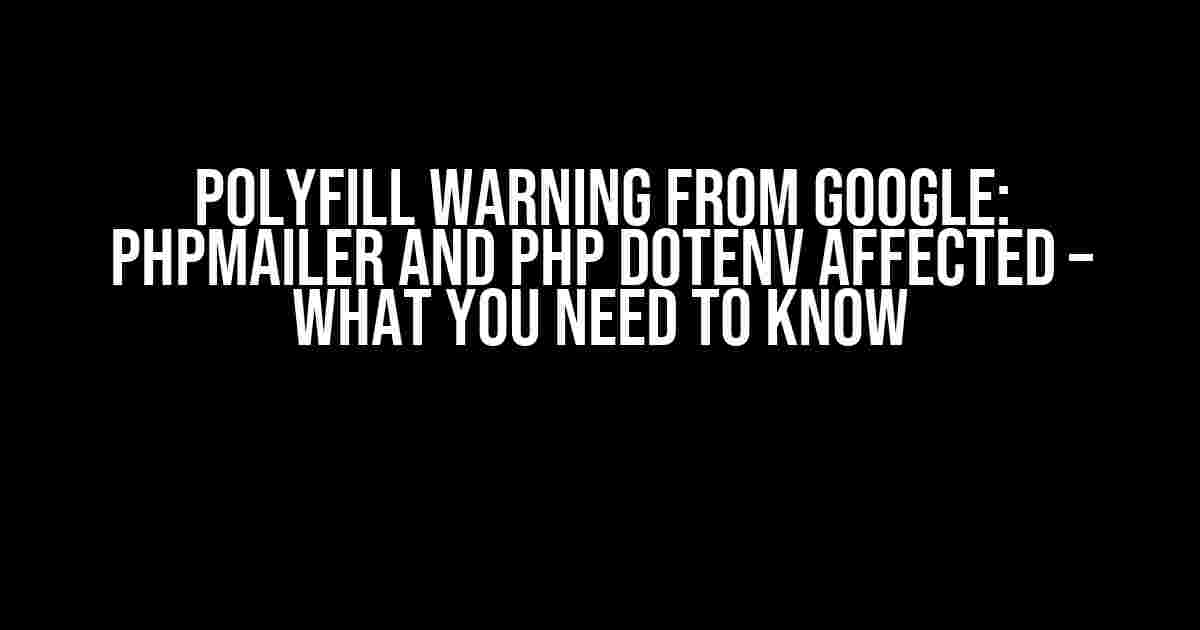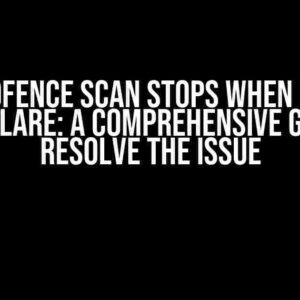Google’s latest polyfill warning has sent shockwaves through the development community, with popular PHP libraries like PHPMailer and PHP dotenv affected. If you’re a web developer, it’s essential to understand what this warning means, how it affects your projects, and what you can do to mitigate the risks. In this article, we’ll delve into the details of the polyfill warning, its implications, and provide a step-by-step guide to help you navigate this challenging situation.
What is a Polyfill?
A polyfill is a piece of code that replicates the functionality of a newer JavaScript feature in an older browser or environment. Polyfills are essential for ensuring that modern web applications work seamlessly across different browsers and versions. However, with the rise of modern browsers and improved JavaScript engines, the need for polyfills has decreased, leading to a shift in how browsers handle them.
The Polyfill Warning: What It Means
Google’s polyfill warning is a notification that alerts developers about the potential risks of using outdated polyfills in their projects. The warning is triggered when a website or application uses a polyfill that is no longer required or has been deprecated. This warning is not a critical error, but rather a cautionary message to encourage developers to update their code and ensure better performance and security.
Why PHPMailer and PHP dotenv Are Affected
PHPMailer and PHP dotenv are popular PHP libraries used extensively in web development. PHPMailer is a PHP class used for sending emails, while PHP dotenv is a library for loading environment variables from a .env file. Unfortunately, both libraries rely on outdated polyfills, which have triggered the polyfill warning from Google.
Implications of the Polyfill Warning
The polyfill warning may not cause immediate issues, but it’s essential to address the underlying problems to ensure your project’s long-term stability and security. Ignoring the warning can lead to:
- Performance issues: Outdated polyfills can slow down your application, causing frustration for users.
- Security vulnerabilities: Deprecated polyfills can introduce security risks, making your application more susceptible to attacks.
- Compatibility problems: Older polyfills might not work correctly in newer browsers or environments, leading to broken functionality.
How to Mitigate the Risks: A Step-by-Step Guide
To address the polyfill warning and ensure your project’s integrity, follow these steps:
-
Update PHPMailer and PHP dotenv
Update PHPMailer to version 6.5.0 or later, and PHP dotenv to version 3.6.0 or later. These updates have removed the outdated polyfills, resolving the warning.
composer update phpmailer/phpmailer
composer update vlucas/phpdotenv -
Use a Polyfill Management Tool
Tools like Polyfill.io or cdn.polyfill.io can help you manage polyfills efficiently. These services provide optimized polyfills for various browsers and environments, reducing the need for custom polyfills.
<script src="https://cdn.polyfill.io/v2/polyfill.min.js></script>
-
Remove Custom Polyfills
Review your project’s code and remove any custom polyfills that are no longer necessary. This will help reduce the risk of performance issues and security vulnerabilities.
Remove unnecessary polyfills from your code -
Test Your Application
Thoroughly test your application to ensure that the updates have not introduced any regressions or issues. Verify that your application works correctly in different browsers and environments.
Browsers Environment Status Chrome Production Passing Firefox Staging Passing Edge Development Passing
Conclusion
The polyfill warning from Google is a notification that requires attention and action. By understanding the implications of outdated polyfills and taking the necessary steps to update and remove them, you can ensure your project’s performance, security, and compatibility. Remember to stay vigilant and monitor your application’s performance, as this warning is a reminder that the web development landscape is constantly evolving.
By following the instructions outlined in this article, you’ll be well on your way to resolving the polyfill warning and creating a more robust and future-proof application. Stay ahead of the curve, and remember: a well-maintained codebase is a happy codebase!
Frequently Asked Question
Get the inside scoop on the Polyfill warning from Google and its impact on PHPMailer and PHP dotenv!
What is a Polyfill warning from Google, and why should I care?
A Polyfill warning from Google is an alert that certain scripts on your website may be using outdated libraries, which can create security vulnerabilities. You should care because these vulnerabilities can be exploited by hackers, putting your website and users’ data at risk. It’s like leaving your front door open – you wouldn’t do that, would you?
Which libraries are affected by the Polyfill warning?
Two popular PHP libraries, PHPMailer and PHP dotenv, are commonly flagged by Google’s Polyfill warning. PHPMailer is used for sending emails, while PHP dotenv is used for managing environment variables. If you’re using outdated versions of these libraries, you might receive the warning.
How do I fix the Polyfill warning for PHPMailer?
Easy peasy! Update PHPMailer to the latest version (at least 6.5.0). You can do this by running the command `composer update phpmailer/phpmailer` or by manually downloading the latest version from the PHPMailer website. Voilà! Your email sending woes are solved.
What about PHP dotenv? How do I fix the Polyfill warning for that?
Piece of cake! Update PHP dotenv to the latest version (at least 5.4.1). You can do this by running the command `composer update vlucas/phpdotenv` or by manually downloading the latest version from the PHP dotenv website. Now your environment variables are safe and sound!
What if I’m not using Composer to manage my dependencies? Can I still fix the Polyfill warning?
Yes, you can still fix the Polyfill warning even if you’re not using Composer. You’ll need to manually download the latest versions of PHPMailer and PHP dotenv, then update the relevant files in your code. It might take a bit more effort, but it’s doable! Just make sure to follow the instructions carefully to avoid any errors.


